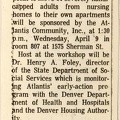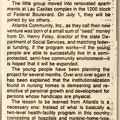[Headline] Handicapped Pin Hope on Atlantis
By Sharon Sherman
Denver Post Staff Writer
The word "activist' once scared a group of young Handicapped Denverites.
But after almost two years of wheeling themselves onto picket lines, sitting through meetings with government agencies and speaking out about the problems of being shunted out of the mainstream of society, they agree that the term activist describes what they have become.
And they are proud of it.
"At least we're actively trying to do what we can instead of sitting back and wishing', is the way Carolyn Finnell, 31, sees the new role of many physically handicapped young people.
[Subheading] Buses for Handicapped
Carolyn, and others like her in the handicapped community, helped convince the Regional Transportation District to begin adding buses equipped for the handicapped. They have testified at various hearings about problems of the disabled. [TEXT UNREADABLE]
They are among the principal planners of the Atlantis Community, a project which would offer the physically handicapped many types of residential living arrangements with services they need available nearby.
Carolyn, who has cerebral play which confines her to a wheelchair and distorts her speech, said it was hard to "face speaking out" to rooms full of strangers, but that living with other young adults at Heritage House Nursing Home youth wing has "brought me out a lot."
[Subheading] Stayed Inside Shell
If Mike Smith, 20, had had his way, he would have stayed inside his shell of poetry writing, reading, and discussing philosophy and listening to music.
"I don't like being in politics, but it seems that's the way we have to go,'' Mike explained. " I guess you have to lose a little to get a lot.''
Linda Chism, 27, believes that for the first time, there are enough young disabled people ready and willing to push themselves forward, to speak out, that there is a chance of changing the entire lifestyle of the handicapped.
For Mike Smith, those changes may come too late to be enjoyed.
[Subheading] Depressed, Angry
Mike has muscular dystrophy, a fatal disease. He has spent the past five years in nursing homes, living in one where, at 15, he was punished for breaking rules and being sent to the locked ward for 24 hours at a time.
Finally, lonely for friends his own age, depressed at watching his elderly roommate die of cancer, angry at rules which confined him to the small world of the nursing home, Mike attempted suicide.
"Luckily, I had no idea how to go about it," he remembers. "I took 20 bowel softener pills and instead of dying just created an incredible mess."
For Mike, as for Carolyn, the youth wing at Heritage House is infinitely better than what they had before.
But, Mike points out, once the first door that closes any human being away from the rest of the world is opened, that human being will see other doors to open.
So it has been for Carolyn, who counted fishhooks for five years in a sheltered workshop before someone recognized her potential.
[Subheading] Wants Meaningful Job
Now, with a degree in journalism from Community College behind her, Carolyn wants some other things she's not getting out of life. Things like a meaningful job, an apartment of her own where she won't have to keep half her belongings in boxes under the bed, the privacy to entertain friends.
"I'm probably living a more active life than I ever have before", she said, explaining that she now edits the youth-wing newsletter and is learning braille so she can tutor blind students. Having come so far, Carolyn's not willing to stop here.
Neither is Linda Chism, who has had crippling rheumatoid arthritis for 20 years.
Linda has "suffered a lot of surgery and a lot of hard, hard therapy" to become fairly mobile. She has taken three years of courses in biology and psychology at the University of Colorado. She was even offered a full-time job.
[Subheading] System Inflexible
But the system doesn't allow even the disabled who are capable of supporting themselves to do so, Linda said.
If she was paid even minimum wage, she would earn too much and would lose her Social Security benefits. But it would take much more than a minimum wage salary to pay living expenses plus the $150 a month it would cost her to get to work and back. In addition, she would no longer receive Medicaid assistance, and medical bills for someone in Linda's condition are enormous.
"Who's going to pay a beginner with no experience that much money?" she asked.
[Subheading] Innovative Projects
For now, for these and other physically handicapped young adults, the boundaries of their world still don't go far beyond the nursing home walls.
But those boundaries will expand dramatically if the young disabled can find support for two innovative projects.
One is Project Normalization, a one year pilot study to find out what services young people in nursing homes need to live as normal a life as possible.
The project would be conducted at the young wing of Heritage House and is estimated to cost $241,872. The state Department of Social Services has suggested that the pilot project be run by the Department of Physical Medicine of the University of Colorado Medical School. Members of the department now are investigating that possibility.
[Subheading] Denied Normal Life
"Disabled people are often denied any resemblance of a normal life," the project introduction says.
"Because of the segregation they encounter, and the sheltered nature of their early lives, when they reach young adulthood they are incapable of functioning satisfactorily in society and so are banished to nursing homes where the repressive, nonstimulating and socially undemanding environment serves only to multiply their social inadequacies and further depersonalize them.
As its creators see it, Project Normalization would begin to to prepare handicapped young adults for the kind of independent living they hope Atlantis will someday offer.
[Subheading] Create a Community
Atlantis is an ambitious project, planned by a group of both handicapped and able bodied persons, which would create a community of residential units surrounding a hub housing medical, rehabilitative employment, counseling, homemaker, transportation, food and social services.
The goal of the community will be to "provide needed services while respecting the individual resident's freedom and privacy," according to the project booklet.
For some of the prospective tenants of Atlantis, that goal can't be realized too soon.
"I just sort of wish they'd hurry, " said Mike Smith. "Some of us have fatal diseases, you know, I only have two or three years to wait. "
- Created on
- Wednesday 10 July 2013
- Posted on
- Friday 22 January 2016
- Tags
- able bodied, apartments, Atlantis Community, braille, buses, Carolyn Finnell, disabled activists, handicapped, Heritage House, independent living, job, journalism, Linda Chism, lock ward, mainstream, Medicaid, meeting, Mike Smith, nursing home, picketing, segregation, sheltered workshop, suicide, University of Colorado, youth wing
- Visits
- 4383
- Rating score
- no rate
- Rate this photo


0 comments